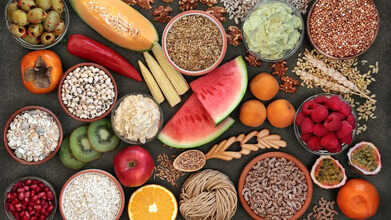- Health Conditions A-Z
- Health & Wellness
- Nutrition
- Fitness
- Health News
- Ayurveda
- Videos
- Medicine A-Z
- Parenting
- Web Stories
Is Apple More Effective In Waking You Up Than Coffee?

Credit: Canva
Let's just admit it, coffee is our go-to beverage when it comes to getting a quick energy boost in the morning. Of course, Chai lovers won't agree, and neither would those who consume energy drinks. However, all-in-all, for most of us, it is the caffeine shot that pulls us out of our beds, to our workplaces and makes us functional throughout the day.
But what if I told you I have a better option and that too without any side effects? Yes! Not many know but apples are excellent energy boosters. Apples, scientifically called Manus, are packed with copper, potassium, vitamins K & C. But besides that, they have a special type of sugar-Fructose, which leads to a steady release of energy throughout the day. Apples also have lots of fibre, which can help balance your blood sugar and give you sustained energy without blood sugar crashes. And while biting on a juicy, crunchy apple may not provide the instant spike in energy you're looking for, it may keep you charged throughout the day.
Coffee Vs Apples For Energy
Although coffee is great for boosting your energy in the morning, it can also negatively impact you. Drinking too much can make you feel jittery or anxious. It can also interfere with your sleep. Having too much caffeine can cause nervousness, anxiety, insomnia, dehydration, upset stomach and fatigue, according to the National Library of Medicine (NLM).
On the other hand, apples contain a natural sugar called fructose, which can serve as an important source of energy for your body, according to the International Food Information Council Foundation. The fructose doesn't give you the same jolt as coffee because it's not a stimulant, but it provides slow, sustained energy that also won't make you feel anxious or affect your sleep quality. If your blood sugar levels are low, eating an apple may help you wake up and feel more alert. Besides, apples are also a great source of fibre and can have lots of phytochemicals and vitamin C, according to the Harvard T.H. Chan School of Public Health.
Other Health Benefits Of Apples
Apples are nutrient-dense, offering fiber, vitamin C, and antioxidants like polyphenols, which contribute to their numerous health benefits. Their high fiber and water content make them filling, aiding weight loss and reducing BMI. Rich in soluble fiber, apples promote heart health by lowering cholesterol and blood pressure, while their polyphenols may reduce stroke risk. Regular apple consumption is linked to a lower risk of type 2 diabetes, likely due to quercetin’s effects. Apples support gut health by acting as a prebiotic, fostering good bacteria.
The antioxidants present in apples may help prevent certain cancers and protect the brain from oxidative stress, potentially lowering the risk of Alzheimer’s. Quercetin in apple skin may also aid in reducing asthma-related inflammation. Additionally, apples may contribute to better mental health, improved digestion, and a lower risk of GERD. While more human research is needed, apples remain a versatile and beneficial addition to a healthy.
Is The Viral Wellness Trend ‘Fibremaxxing’ Helping Or Harming Your Gut?

Credits: CANVA
Tiktok fibremaxxing wellness trend: There is no shortage of wellness trends online that claim to transform your health, but a new one has taken over social media with a focus on gut health. It’s called “fibremaxxing,” and its premise is simple: eat more fibre to improve digestion, metabolism, immunity, and lower the risk of disease. On TikTok and Instagram, the trend often appears as colourful lentil bowls, chia puddings, and smoothies loaded with leafy greens and flaxseeds. But how much of this viral trend is actually backed by science?
The idea of increasing both soluble and insoluble fibre isn’t new, yet fibremaxxing has made it trendy again—and this time, for good reason. Fibre is vital to everyday health, supporting everything from steady blood sugar to regular bowel movements. Here’s what experts say about this growing movement and why fibre truly matters.
What Is Fibremaxxing?
Fibremaxxing is a social media movement that encourages people to boost their fibre intake by adding more fruits, vegetables, legumes, and whole grains to every meal. The goal is to improve digestion, promote fullness, and support long-term health. According to Dr. Urvi Shah, a board-certified hematologist-oncologist and physician at Memorial Sloan Kettering Cancer Center, the concept behind fibremaxxing is largely rooted in scientific evidence. Dr. Shah, who is leading multiple studies on high-fibre plant-based diets, notes that the approach aligns well with established nutrition research.
Is ‘Fibremaxxing’ Good Or Bad For Your Gut?
High-fibre diets are consistently linked to a wide range of health benefits, from lowering the risk of heart disease, diabetes, and colon cancer to aiding weight control and gut function. That’s why Dr. Shah believes fibremaxxing gets several aspects right.
She explains that including a wide variety of plant-based, high-fibre foods is essential because “different fibre types feed different microbes.” A diverse diet helps nurture a balanced microbiome. She adds that the trend’s emphasis on whole foods rather than processed or fibre-enriched items is a major plus. “Whole plants provide fibre, polyphenols, and micronutrients that work together to support the gut,” she says. Prebiotic-rich foods also help shape a healthier microbiota and increase the production of beneficial short-chain fatty acids like butyrate, which has “anti-inflammatory and anti-cancer effects.”
Simply put, upping your fibre intake through natural, unprocessed foods, rather than supplements, can make a real difference to gut health.
What’s The Daily Recommended Amount of Fibre Intake?
Experts suggest that adults should consume between 25 and 30 grams of fibre each day. Men typically require more (around 38 grams), while women need about 25 grams. These numbers can vary depending on age, sex, and calorie intake, but a general guideline is 14 grams of fibre for every 1,000 calories eaten, according to Harvard Health.
How To Add Fibre To Your Diet?
Plant-based foods are the easiest way to increase your fibre intake, this could mean starting your morning with oats or simply adding more vegetables to your meals. Dietitian Laura Tilt notes that several everyday foods are surprisingly high in fibre:
- Rolled porridge oats – 4.5g per 50g (half cup)
- Canned chickpeas – 7g per half can
- Seeded bread – 5g per two slices
- Canned lentils – 6g per half can
- Frozen peas – 4.5g per 80g (3 tbsp)
- Frozen raspberries – 5.5g per 80g (3 tbsp)
- Wholemeal pasta – 6.5g per 75g serving
- Dried apricots – 3g per 3–4 pieces
- Reduced salt/sugar baked beans – 7.5g per half can
- Mixed milled seeds (flax, pumpkin, chia) – 4.5g per 25g
Is Fibremaxxing Helpful?
There’s no doubt fibre plays an essential role in maintaining good health. But like any nutrient, too much of it can cause problems if not balanced properly. A sudden surge in fibre intake without enough water can lead to bloating, gas, constipation, dehydration, or even trigger IBS symptoms. Over-focusing on fibre might also cause you to overlook other nutrients your body needs. The key is moderation, fibre is beneficial, but it works best as part of a balanced, varied diet.
Why Cant I Digest Milk, But Can Easily Eat Yogurt?

Credits: Canva
If you landed here, the reason is that you are also someone who cannot tolerate milk, but loves yogurt, and are probably wondering why is that?
The logic is that if you have lactose intolerance, you won't be able to digest any dairy product, but with yogurt, your life is easy. The answer lies in the components of the two various dairy products that come from the same source.
Why Can't You Digest Milk?
The reason is because you are lactose intolerant. This is a condition that makes it hard to digest the sugar in milk and milk products, called lactose. People with lactose intolerance could have diarrhea, gas and bloating after they consume milk. While this condition is usually harmless, it can cause discomfort.
This happens because the enzymes in the small intestine, called lactase is responsible for lactose intolerance. If someone has too low levels of lactase, the person can become lactose intolerant.
The small intestine and colon are parts of the digestive tract, which processes the foods you eat. The intestine pull out nutrients from the food and whatever is not absorbed by the intestines continues along the digestive tract and is expelled as stool during a bowel movement.
But Why Can You Digest Yogurt, If You Cannot Digest Milk?
The answer to this lies in the fermentation process that turns milk into curd and breaks down much of the lactose, which is the sugar, that is often difficult to digest. The probiotic bacteria used to make curd contain their own lactase, which helps in the breakdown of lactose, and this can further help with digestion even for those who do not produce enough lactase on their own.
Furthermore, during fermentation, the bacteria in curd, called the Lactobacillus bulgaricus and Streptococcus thermophilus convert lactose into lactic acid, which is easier for the body to process. This helps your body to digest curd easily over milk. Since the bacteria contains lactase, which the milk lacks, some people may find it easier to digest curd or yogurt over milk.
The bacterial cells also physically protect their lactase, and it can work to break down the lactose from the curd as it passes through the digestive system.
Why Is Curd Gut-Friendly?
The key to a healthy gut health is lactobacillus, a kind of probiotic, which helps in digestion, suppression of disease-causing bacteria and treats constipation. It also is beneficial in treating irritable bowel syndrome. It breaks down sugar into lactic acid.
A study by a Bhubaneswar-based professor Balamurugan Ramdas also revealed that Bengal or Odisha's popular breakfast Panta Bhaat, which includes fermented cooked rice, also releases the same bacteria, that fermented milk releases and so it contains short-chain fatty acids, which are responsible for improving gut health and boosting immunity.
Furthermore, curd is known to balance the gut flora, probiotics improve digestion, and the absorption of nutrition. They also help in the breakdown of food, reducing issues like bloating, gas, and constipation. The probiotics in curd can help restore the natural balance in your gut, which can soothe an upset stomach and alleviate discomfort from indigestion. A healthy gut is closely linked to a strong immune system, and the probiotics in curd help to boost gut health, which in turn can enhance immunity.
Does What Time You Eat Breakfast Reveal How Long You Will Live? Study Reveals Why Time Matters For Breakfast

(Credit-Canva)
While people do take eating healthily seriously, many people forget to take the timing into consideration. Many studies have shown that eating late at night or midnight snacking is bad for your metabolism and makes you gain weight, but does the same logic apply to how early you eat your breakfast? A new published in Communications Medicine explains why the timing may be important, even for breakfast.
The time you eat breakfast could play a surprising role in your overall health and even influence how long you live. New research suggests that for older adults, meal timing, especially when they eat their first meal, may reveal important clues about their health status. The study found that eating breakfast later in the day was linked to higher rates of health issues like depression, fatigue, and dental problems, along with a greater risk of early death.
Experts believe that changes in an older person's meal schedule, particularly breakfast time, could be an easy way to check on their general health. He suggests that encouraging older adults to stick to regular mealtimes could be an important step in promoting healthy aging and a longer life.
How Does Breakfast Timing Affect Health?
The research followed almost 3,000 adults in the U.K., aged 42 to 94, for over 20 years. The people in the study reported their usual times for breakfast, lunch, and dinner, along with details about their health.
Meal Times Shifted Later with Age
As the participants got older, both their breakfast and dinner times gradually became later. For every ten years of life, breakfast was delayed by about eight minutes and dinner by four minutes.
The Serious Connection
Most importantly, delaying breakfast was linked to having more long-term health problems and a higher chance of death during the study period. For every hour breakfast was delayed, the risk of death went up by 8–11%.
Experts emphasized that eating later, especially delaying breakfast, is tied to both health problems and a higher risk of death in older people. This finding gives new weight to the old saying that breakfast is the most important meal of the day, especially for seniors.
Why an Early Breakfast is Better for Your Health
While this study can't definitively prove that eating earlier directly causes a longer lifespan, experts agree that the evidence strongly supports a regular, early breakfast habit.
Work with Your Body's Clock
Experts recommend having breakfast within one to two hours of waking up. Experts also explained that our body's ability to process food is best right after we wake up.
Avoid Health Risks
Skipping or heavily delaying breakfast can lead to dangerous spikes in blood sugar later in the day. These spikes can hurt blood vessels, increase body inflammation, and raise the risk of serious illnesses like type 2 diabetes and heart disease.
Keep Your System in Sync
Eating early helps keep your body's internal 24-hour clock (circadian rhythm) working correctly. This proper timing supports better metabolism and better sleep patterns throughout the day.
The Importance of Routine
Health experts strongly emphasize that the consistency of your mealtimes is just as important as the time itself. Eating at regular times helps keep the body's natural 24-hour rhythm strong, which controls everything from digestion to hormones.
A healthy life includes a routine of exercise, good sleep, social connections, and healthy eating habits, which means being thoughtful about what you eat and when you eat it.
By regularly eating breakfast and dinner earlier, you match your eating pattern with your body's natural cycle. This can help you avoid eating too much late at night and supports better sleep. Having a simple, consistent breakfast may be one of those small, daily choices that add up to a longer, healthier life.
© 2024 Bennett, Coleman & Company Limited

